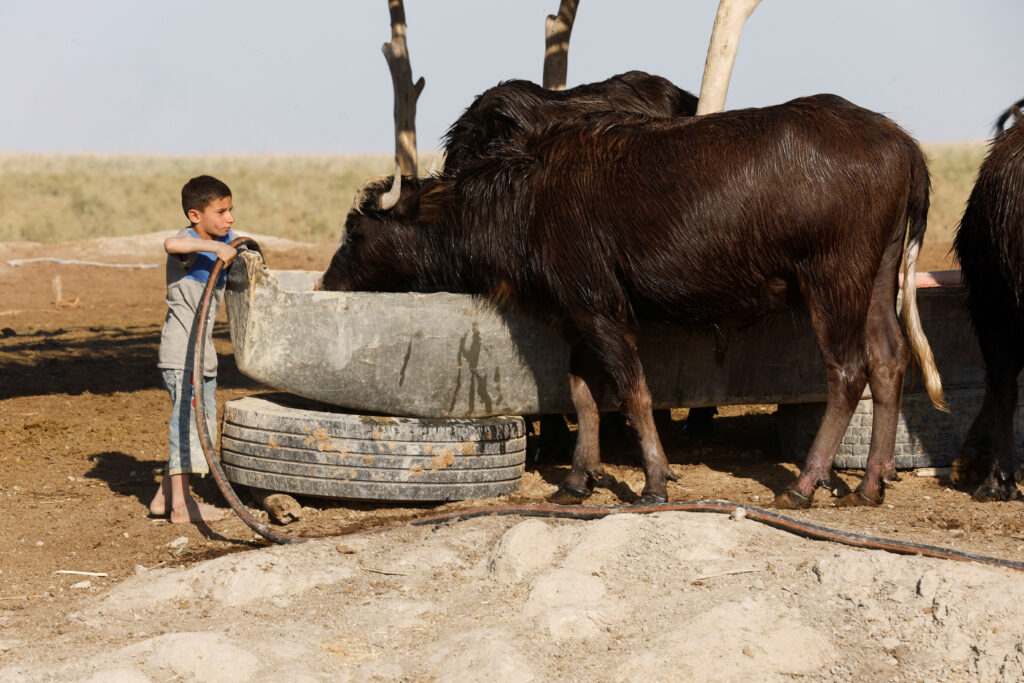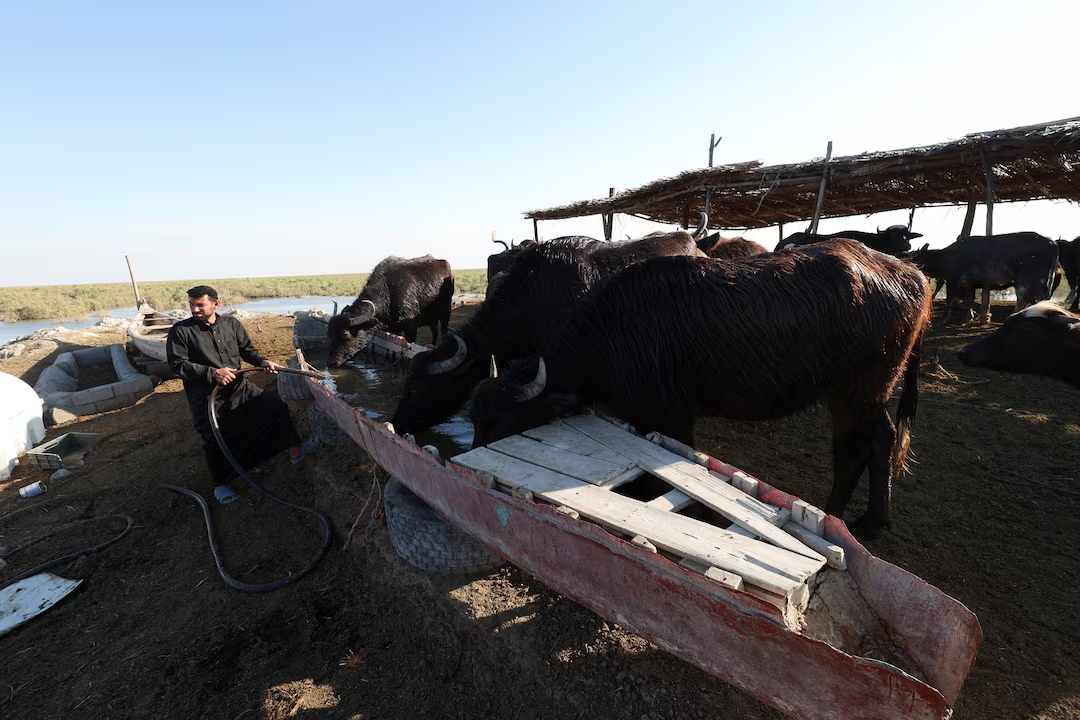In the southern wetlands of Iraq, Buffalo Farmers Fight is more than just a livelihood—it’s a way of life. But today, this ancient tradition is under serious threat. Long periods of drought, combined with upstream water restrictions and climate change, are destroying the environment that has supported water buffalo for centuries.
The once-green marshes of Iraq, where buffalo roam and graze freely, are drying up fast. As a result, thousands of farmers are being pushed to the edge of survival. Their animals are dying, their incomes are disappearing, and their future is uncertain.
A Way of Life Disappearing
Sabah Ismail, a buffalo farmer in the Dhi Qar province of southern Iraq, remembers better times. “We used to have 120 or 130 buffalo,” he says, standing near a muddy, shrinking waterway. “Now, I have only around 50 or 60. Some died from the heat and lack of food. Others we were forced to sell just to survive.”

Buffalo farming in Iraq is a tradition that dates back thousands of years, especially in the Mesopotamian marshlands. These large animals are mainly raised for their rich milk, which is turned into traditional cheeses and creams—a staple in Iraqi cuisine. Families pass down buffalo herding knowledge from one generation to the next. But now, even these deeply rooted customs are fading away.
“People have left the area,” Ismail says. “There were once many families here. Now, only a few remain. The others have moved away because they couldn’t keep their buffalo alive.”
Water Shortages Strike Hard
The biggest problem facing buffalo farmers today is the severe lack of water. Iraq relies heavily on two major rivers, the Tigris and Euphrates. But in recent years, the flow of water from these rivers has decreased drastically.
Several reasons are to blame. Climate change has led to higher temperatures, less rainfall, and long dry spells. At the same time, dams built by neighboring countries like Turkey and Iran have reduced the amount of water flowing downstream into Iraq. This has turned many parts of the southern marshes into cracked earth and dust.
Without enough water, there is no grass or reeds for the buffalo to eat. Farmers are forced to buy expensive feed, which many simply cannot afford. As a result, buffalo are growing weaker, producing less milk, and dying in larger numbers.
Jassim al-Asadi, an environmental expert and the director of Nature Iraq, a local non-governmental organization, warns that the situation is becoming catastrophic. He estimates that nearly one-third of the buffalo population in Iraq’s marshes has been lost. Fish populations in the same areas have also dropped by as much as 95 percent, destroying another major source of food and income for locals.
A Deepening Economic Crisis
The death of buffalo in large numbers is not just a tragedy for the animals and their caretakers—it’s also creating a growing economic crisis in southern Iraq.
In villages where most families relied on buffalo milk and meat for their livelihood, many now face poverty. Some are moving to cities in search of jobs. Others are staying behind but struggling to make ends meet.
Abdul Hussain Sbaih, a 39-year-old farmer, is worried about what the future holds. “This summer could be even worse,” he says. “If it doesn’t rain and the rivers don’t fill, I fear half of my buffalo could die.”
In many parts of the marshes, traditional mud homes stand empty as families abandon the land they’ve lived on for generations. Rural communities are shrinking, and the loss of buffalo is taking a toll on the entire economy.
Government and Global Response
Recognizing the seriousness of the crisis, the Iraqi government has started to take action. In 2023, officials announced emergency funding to support buffalo farmers in the south. This included distributing feed and veterinary supplies to farmers in need.
The government also partnered with international organizations like the Food and Agriculture Organization (FAO) of the United Nations. These partnerships are helping to assess the damage and offer short-term solutions, such as emergency feeding programs and mobile veterinary services.
Dr. Salah El Hajj Hassan, FAO’s representative in Iraq, has spoken openly about the urgency of the situation. He said that the marshes—and the communities that rely on them—are on the verge of collapse if immediate action isn’t taken.
The FAO has called for more long-term efforts, including improved water management systems, better irrigation infrastructure, and environmental conservation programs. However, such projects require significant funding, planning, and political cooperation, especially when it comes to negotiating water sharing with neighboring countries.
A Culture at Risk
The danger to buffalo farming in Iraq is more than just economic. It’s cultural. The marshlands are part of Iraq’s rich heritage and were once recognized by UNESCO as a World Heritage Site. The people who live there are known for their close relationship with the land and water.
Losing the buffalo means losing an entire way of life. Traditional foods, family rituals, and even local songs and stories are tied to these animals. If current trends continue, experts warn that a unique part of Iraq’s identity could disappear forever.
Many local leaders are trying to raise awareness about this cultural loss. They are urging the government and international donors not only to provide emergency help but also to invest in long-term preservation efforts.
Hope on the Horizon?
Despite the many challenges, there is still hope. Some farmers are adapting by using more efficient irrigation methods. Others are experimenting with new feed sources or working together in cooperatives to reduce costs. Environmental groups are pushing for stronger protection of water sources and stricter rules on upstream damming.
But time is running out. Without serious investment and cooperation at all levels, Iraq’s buffalo herding tradition may not survive another decade.
For the farmers of the marshes, buffalo are more than livestock—they are family, heritage, and home. Their survival depends not only on weather and water but on the world’s willingness to act before it’s too late.
iQ Cars Raises 7-Figure Seed Round to Modernize Iraq’s Auto Market



